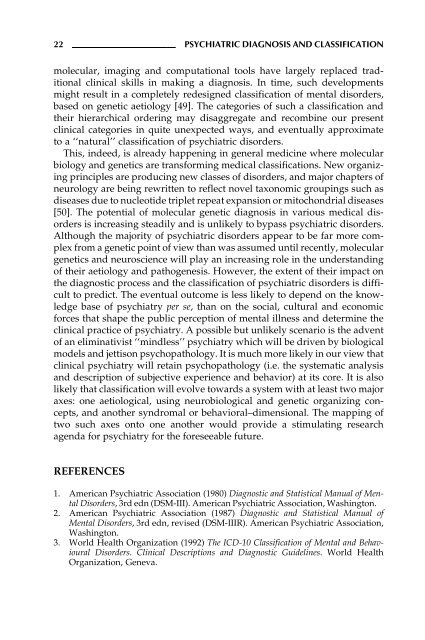Psychiatric Diagnosis and Classification - ResearchGate
Psychiatric Diagnosis and Classification - ResearchGate
Psychiatric Diagnosis and Classification - ResearchGate
You also want an ePaper? Increase the reach of your titles
YUMPU automatically turns print PDFs into web optimized ePapers that Google loves.
22 PSYCHIATRIC DIAGNOSIS AND CLASSIFICATION<br />
molecular, imaging <strong>and</strong> computational tools have largely replaced traditional<br />
clinical skills in making a diagnosis. In time, such developments<br />
might result in a completely redesigned classification of mental disorders,<br />
based on genetic aetiology [49]. The categories of such a classification <strong>and</strong><br />
their hierarchical ordering may disaggregate <strong>and</strong> recombine our present<br />
clinical categories in quite unexpected ways, <strong>and</strong> eventually approximate<br />
to a ``natural'' classification of psychiatric disorders.<br />
This, indeed, is already happening in general medicine where molecular<br />
biology <strong>and</strong> genetics are transforming medical classifications. New organizing<br />
principles are producing new classes of disorders, <strong>and</strong> major chapters of<br />
neurology are being rewritten to reflect novel taxonomic groupings such as<br />
diseases due to nucleotide triplet repeat expansion or mitochondrial diseases<br />
[50]. The potential of molecular genetic diagnosis in various medical disorders<br />
is increasing steadily <strong>and</strong> is unlikely to bypass psychiatric disorders.<br />
Although the majority of psychiatric disorders appear to be far more complex<br />
from a genetic point of view than was assumed until recently, molecular<br />
genetics <strong>and</strong> neuroscience will play an increasing role in the underst<strong>and</strong>ing<br />
of their aetiology <strong>and</strong> pathogenesis. However, the extent of their impact on<br />
the diagnostic process <strong>and</strong> the classification of psychiatric disorders is difficult<br />
to predict. The eventual outcome is less likely to depend on the knowledge<br />
base of psychiatry per se, than on the social, cultural <strong>and</strong> economic<br />
forces that shape the public perception of mental illness <strong>and</strong> determine the<br />
clinical practice of psychiatry. A possible but unlikely scenario is the advent<br />
of an eliminativist ``mindless'' psychiatry which will be driven by biological<br />
models <strong>and</strong> jettison psychopathology. It is much more likely in our view that<br />
clinical psychiatry will retain psychopathology i.e. the systematic analysis<br />
<strong>and</strong> description of subjective experience <strong>and</strong> behavior) at its core. It is also<br />
likely that classification will evolve towards a system with at least two major<br />
axes: one aetiological, using neurobiological <strong>and</strong> genetic organizing concepts,<br />
<strong>and</strong> another syndromal or behavioral±dimensional. The mapping of<br />
two such axes onto one another would provide a stimulating research<br />
agenda for psychiatry for the foreseeable future.<br />
REFERENCES<br />
1. American <strong>Psychiatric</strong> Association 1980) Diagnostic <strong>and</strong> Statistical Manual of Mental<br />
Disorders, 3rd edn DSM-III). American <strong>Psychiatric</strong> Association, Washington.<br />
2. American <strong>Psychiatric</strong> Association 1987) Diagnostic <strong>and</strong> Statistical Manual of<br />
Mental Disorders, 3rd edn, revised DSM-IIIR). American <strong>Psychiatric</strong> Association,<br />
Washington.<br />
3. World Health Organization 1992) The ICD-10 <strong>Classification</strong> of Mental <strong>and</strong> Behavioural<br />
Disorders. Clinical Descriptions <strong>and</strong> Diagnostic Guidelines. World Health<br />
Organization, Geneva.

















